Supermarkets could be forced to sell their wholesale businesses or some sites to boost competition.
Competition in the retail grocery sector "is not working well for consumers", the Commerce Commission's study into supermarkets has concluded.
The finding comes as part of the competition watchdog's draft report on the level of competition in the $22 billion supermarket sector.
"If competition was more effective, retailers would face stronger pressures to deliver the right prices, quality and range to satisfy a diverse range of consumer preferences," chair Anna Rawlings said today.
The Commission's draft findings are preliminary and still subject to consultation prior to its final report being published in late November this year.
Rawlings said the market could be best described as a "duopoly" with a fringe of other competitors. The two major supermarket groups, Progressives and Foodstuffs, considered only each other when considering prices.
The two groups did not tend to compete head-on, Rawlings said.
"Our preliminary view is that the core problem is the structure of the market. In competitive terms, the major retailers, Woolworths NZ and Foodstuffs, are a duopoly, and while there is an increasingly diverse fringe of other grocery retailers, they have a limited impact on competition.
"This is because they are unable to compete with the major grocery retailers on price and product range in order to satisfy the widespread consumer demand for a main shop at a single store," Rawlings said.
"All things being equal" Kiwis were likely to pay less for groceries if competition was stronger.


The commission that the levels of profit being earned by both groups were "persistently high". Both groups were earning a return on capital of more than 20 per cent.
"If competition was working better, we would expect these profits to encourage other players into the market" or expansion by smaller players, to share in those profits.
"We haven't seen that," Rawlings said.

The market study is the second of its type under new powers to compel companies to provide detailed financial information, following an examination into petrol companies ordered by Prime Minister Jacinda Ardern in 2018.
For months, the Wellington-based competition watchdog has been receiving evidence and interviewing witnesses, sometimes under oath.
Like many industries in New Zealand, it is a sector dominated by two companies. Foodstuffs, which counts New World, Pak n Save and Four Square among its subsidiaries, and Australian-owned Woolworths, the owner of Countdown.
The market study is set to take around 12 months but even the draft report is likely to run to hundreds of pages and make recommendations to improve competition levels.
Multiple parties are speculating that among its recommendations would be a binding code of conduct for supermarkets to adhere to, the regulator could urge the government to consider requiring a break-up of some parts of the sector.

Katherine Rich, the former National MP and long time chief executive of the Food and Grocery Council has been providing materials to the commission including research that suggests most suppliers believe the supermarket groups engage in anti-competitive behaviour.
This week, Rich launched a stinging attack targeting Foodstuffs' North Island business, claiming that even on the eve of the draft report, its members were facing the threat of having their products removed from shelves as part of negotiating tactics, demands for a "display fee" which did not promise any actual prominence or contribution to staff wages.
Foodstuffs were "either not reading the political environment or dismissing government concerns which led [Clark] to call for the Study," Rich wrote on her LinkedIn page.
Foodstuffs did not respond to a request for comment on the claims.












